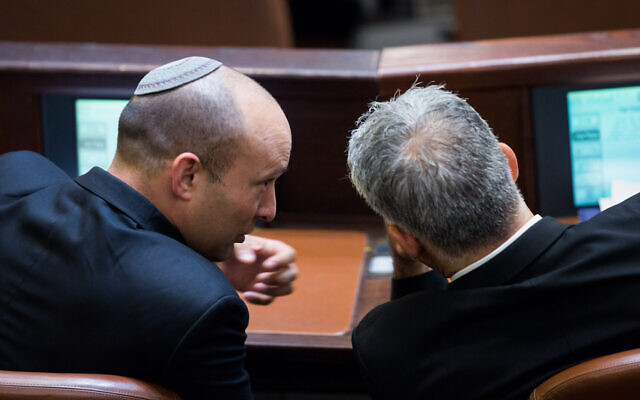New Hope chief Gideon Sa’ar has conditioned joining a government led by Yesh Atid leader Yair Lapid on the fellow right-wing Yamina party also doing so, Israeli television reported Monday.
Sources close to Sa’ar told the Kan public broadcaster that if Lapid is able to put together a ruling coalition but Yamina head Naftali Bennett does not join, “it’s just a left-wing government.”
Therefore, the report said, Sa’ar could back a government Lapid heads if the Yesh Atid leader switches off as prime minister with Bennett.
While Sa’ar said in the run-up to last week’s elections that Lapid will not be prime minister, he later refused to rule out sitting in a government led by the Yesh Atid chief. Bennett, however, pledged not to sit in a government headed — solely or via a power-sharing agreement — by Lapid.
The centrist Yesh Atid is the largest party in the “change bloc” of factions opposed to Prime Minister Benjamin Netanyahu with 17 seats. New Hope has six seats while Yamina, which has not committed to any bloc, has seven.
Separately, Channel 13 news reported Bennett is refusing to commit to ousting Netanyahu unless he is given the premiership, which Lapid won’t cede.
Despite the ambitious demand, Bennett told his fellow party members and close activists that he stands by his commitment to ensure Israel doesn’t head to a fifth round of elections in two years, according to Channel 12 News.

Then Education Minister Naftali Bennett (L) with Yesh Atid leader Yair Lapid in the Knesset on September 2, 2015. (Yonatan Sindel/Flash90)
The network also claimed associates of Netanyahu have suggested he forgo efforts to form a new government and instead seek the presidency, after again failing to secure a majority in general elections.
Netanyahu was said to currently be ruling out such a route, preferring to continue his efforts to assemble a coalition and to remain Likud party chairman.
The premier has previously thrown cold water on proposals to appoint him president.
President Reuven Rivlin’s seven-year term as the Jewish state’s 10th president is set to end in July 2021. Israeli presidents are chosen by Knesset legislators and have historically been politicians.
With Netanyahu and his right-wing religious lacking a majority in the incoming Knesset, it is unclear if the Likud chief would have sufficient parliamentary support to be elected president, if he were to pursue the office.
It is also unclear what effect Netanyahu’s election to the post would have on his graft trial. Israel’s quasi-constitutional Basic Laws prevent the president from being brought to trial on criminal charges, but the prime minister’s trial already began last year.

Prime Minister Benjamin Netanyahu, leader of the Likud party, addresses supporters at the party’s election night event in Jerusalem, early on March 24, 2021. (Emmanuel Dunand/AFP)
According to the TV report, which did not cite a source, Netanyahu is concerned about the formation of a government that includes the Likud-allied Haredi parties and the far-right Religious Zionists, along with Yamina, New Hope, Blue and White and possibly Opposition Leader Yair Lapid’s centrist Yesh Atid party.
However, even if Yesh Atid were to join such a coalition, it would still be one seat shy of a majority, based on the unofficial final election results.
The network said United Torah Judaism MK Moshe Gafni was more open to the possibility, but Interior Minister Aryeh Deri, who heads the fellow ultra-Orthodox Shas party, has vowed to only join a government led by Netanyahu.
Netanyahu turned to Gafni, head of the Degel HaTorah faction in UTJ on Sunday, and asked for his backing, but Gafni replied that he needed “time to think,” Kan reported.
MK Yaakov Litzman, leader of UTJ’s Agudat Yisrael faction, said earlier Monday that the Haredi party backs Netanyahu as prime minister, noting its pre-election pledges.
Neither the pro- nor anti-Netanyahu blocs have a clear path to forming a majority coalition after the March 23 vote, the fourth national election in two years. However, the prospect of a fifth election has spurred speculation that unlikely bedfellows could come together in an effort to oust Netanyahu or to enable him to retain power.
According to Channel 13, President Rivlin is seeking to shorten the process of picking the next candidate for prime minister and is considering only tasking one politician — not two — with trying to cobble together a coalition, before passing the mandate to the Knesset.
Normally, two party heads can get a shot at forming a government, but the current deadlock could render that unnecessary. After that, the Knesset is given three weeks for any 61 MKs to recommend a lawmaker as premier, or additional elections are automatically called.
Rivlin, when he meets party representatives, also plans to ask them if they have a second priority, and whether they are open to negotiating with others, seeking to get a fuller picture regarding who is best positioned to form a coalition, the report said.

President Reuven Rivlin casts his vote in the Knesset election in Jerusalem, March 23, 2021. (Mark Neyman/GPO)
Rivlin’s office said Monday that he will two days of consultations with party leaders starting April 5, the same day the evidentiary stage in Netanyahu’s corruption trial begins.
“At the end of the round of consultations, and if required, the president will hold further conversations with the relevant candidates to form a government according to the recommendations of the parties,” a statement from the President’s Residence said.
It added that Rivlin will task a candidate with forming a government on April 7, based on whom he assesses has the best chance of doing so.
 RSS Feed
RSS Feed















 March 30th, 2021
March 30th, 2021  Awake Goy
Awake Goy  Posted in
Posted in  Tags:
Tags: 













